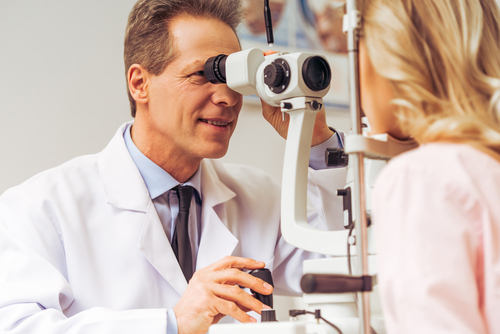Posted by: Associates in Ophthalmology (NJ) in Eye Health
Can’t remember the last time you had an eye exam? That’s usually a sign it’s time for your next one! Having regular yearly eye exams is an important part of keeping your body healthy. Keep reading to learn more about why eye exams are necessary!
Comprehensive Eye Exam vs. Vision Screenings
While vision screenings are helpful, they can’t determine your vision and eye health. Sure, they can pick up on if you have a severe vision issue, but for other problems, you need an eye exam.
Comprehensive eye exams are important because they provide an in-depth look at your eyes. They can even help screen for serious health concerns such as diabetes or cancer. The eyes are often one of the first places symptoms start with serious conditions!
What to Expect
There are many different kinds of tests done to get a full evaluation of your eye health and state of your vision. Some tests are sometimes performed during your yearly physical examination.
Two of the most common tests are visual acuity and the Snell chart. With a Snell chart, you cover one eye at a time while looking at the chart.
This chart helps your eye doctor figure out the depth of your vision. Another common test is an ocular motility test.
This helps determine how well your eyes work together. During an ocular motility test, you will follow an object or light with your eyes while you hold your head still.
Some tests you will have never experienced if you haven’t had a comprehensive eye exam before. A stereopsis test will determine if you have normal depth perception.
You may also undergo a color-blindness test. Some tests will help screen you for diseases or complications. The “puff-of-air” test helps determine if you are at risk for or have glaucoma.
This is done by gauging your intraocular pressure. The test is actually painless and only takes a second. If your doctor thinks you may have cataracts, they’ll perform a slit-lamp exam. This allows your eye doctor to look at the structures of your eyes.
Other tests help determine if you need a prescription. An instrument called a phoropter helps determine the level of nearsightedness and farsightedness.
The phoropter is then used during a refraction test. This can also help determine whether you have astigmatism or presbyopia. Autorefractors and aberrometers can also perform this and are often even more precise.
If you need corrective lenses or contacts, your eye doctor will discuss your options. Don’t want glasses or contacts? You can also consider refractive procedures. It’s important to talk to your eye doctor and figure out what’s best for you.
If you’re not sure, you may want to start with glasses and contacts. Many people wear both to help correct their vision. If you do want refractive surgery, you may be a good candidate for LASIK.
Ready to schedule your comprehensive eye exam? Contact Associates in Ophthalmology in Livingston, NJ for your eye appointment today! Don’t your eyes deserve the best care possible?


